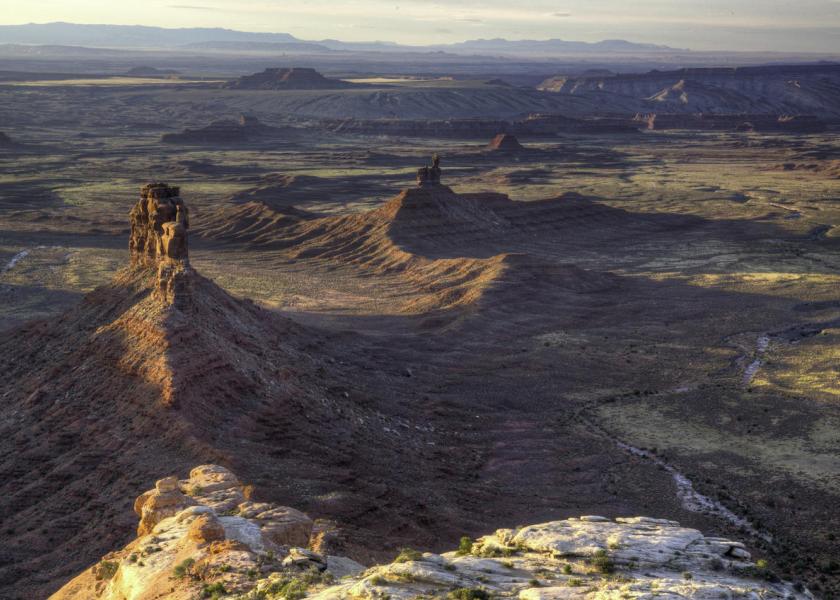Biden Announces Expansion of Bears Ears and Grand Staircase

The White House announced Thursday President Joe Biden would sign three proclamations to restore protections for Bears Ears, Grand Staircase-Escalante, and Northeast Canyons and Seamounts Marine national monuments.
In a statement, the White House said, “President Biden is fulfilling a key promise and upholding the longstanding principle that America's national parks, monuments, and other protected areas are to be protected for all time and for all people."
The Utah monuments, Bears Ears and Grand Staircase-Escalante, have been on Biden's agenda since his first day in office, when he ordered a review of their boundaries and conditions.
The national monuments were designated by previous presidents to protect lands sacred to Native Americans but were significantly cut back during the Trump administration.
The announcement drew praise from tribal and environmental leaders, but also criticism from Utah’s Republican leadership, which claims Utah’s monument questions should be resolved through “collaboration” with state and local officials.
In June after touring southern Utah meeting with monument stakeholders, Biden’s newly installed Interior Secretary Deb Haaland submitted a report to the White House, recommending Biden use the Antiquities Act to enlarge the monuments.
In a move denounced as “unilateral” and as a “midnight” order, President Barack Obama had designated Bears Ears National Monument on 1.35 million acres in San Juan County as he was leaving office in 2016 at the request of five tribes with ancestral ties to these lands, according to the Salt Lake City Tribune.. The decision came after Utah leaders failed to propose a conservation plan for a region rich in archaeological sites and artifacts and sacred to Native Americans.
On Thursday, the Bears Ears Inter-Tribal Coalition, which represents the five tribes that proposed the monument, said Biden is doing “the right thing” by redrawing the boundaries in line with what Obama set.
“For us, the monument never went away. We will always return to these lands to manage and care for our sacred sites, waters, and medicines,” coalition chairman Shaun Chapoose, a longtime elected Ute tribal leader told the Tribune. “The Monument represents a historic opportunity for the federal government to learn and incorporate our tribal land management practices that we developed over centuries and are needed more now than ever.”
Haaland informed Utah’s Republican political leadership on Thursday of Biden’s decision to expand the monuments, prompting a collective expression of frustration, disappointment and a veiled threat of legal action.
“President Biden’s decision to expand the monuments is disappointing, though not surprising. For the past 10 months, we have consistently offered to work with the Biden Administration on a permanent, legislative solution, one that would end the perpetual enlarging and shrinking of these monuments and bring certainty to their management,” read a joint statement issued by Gov. Spencer J. Cox, Lt. Gov. Deidre Henderson, Attorney General Sean Reyes, Senate President J. Stuart Adams, R-Layton, and House Speaker Brad Wilson, R-Kaysville. “Our goal has been to make lasting progress on managing our public lands for the benefit of all those who use them, particularly those who live on and near those lands.”
The National Cattlemen's Beef Association (NCBA) and Public Lands Council (PLC) also criticized the Biden administration decision. NCBA and PLC said refused to create a conservation strategy that would incorporate local stakeholder input and avoid the management whiplash of a unilateral federal designation.
"Rural states and communities across America are, sadly, all too familiar with the federal government's routine of feigned partnership. Monument designations may bring the White House closer to scoring 'conservation' points on paper but in reality, they lead to the kind of preservation strategies that we know from experience do not support healthy ecosystems long-term," said NCBA Executive Director of Natural Resources and PLC Executive Director Kaitlynn Glover.
"Conservation is more than signing a piece of paper and considering the matter closed. Conservation requires long-term planning. Conservation requires active management. Conservation requires the help and investment of knowledgeable land users, local residents, and state leaders who can perform the day-to-day work of maintaining landscapes and ecosystems. We will deliver that message to President Biden and his team as many times as needed," she added.
The proclamations expand Bears Ears to a total of 1.36 million acres and Grand Staircase-Escalante to 1.87 million acres.







